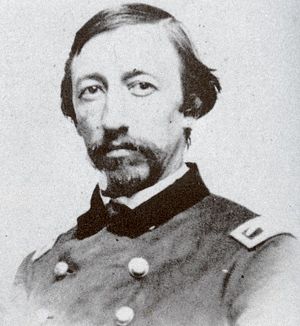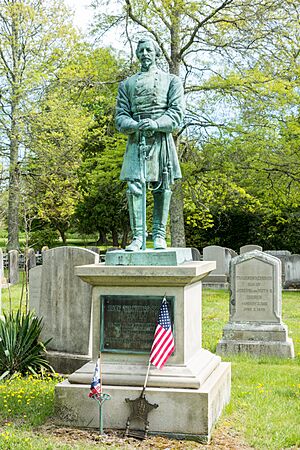Henry Tillinghast Sisson facts for kids
Quick facts for kids
Henry Tillinghast Sisson
|
|
|---|---|
 |
|
| Lieutenant governor of Rhode Island | |
| In office 1875–1877 |
|
| Governor | Henry Lippitt |
| Preceded by | Charles C. Van Zandt |
| Succeeded by | Albert Howard |
| Personal details | |
| Born | August 20, 1831 |
| Died | October 19, 1910 (aged 79) Little Compton, Rhode Island |
| Resting place | Union Cemetery, Little Compton |
| Political party | Republican |
| Spouses | Nettie Walworth; Emily Josephine Brownell |
| Residence | Little Compton, Rhode Island |
Henry Tillinghast Sisson (born August 20, 1831 – died October 19, 1910) was an important person in American history. He was a colonel in the Union Army during the American Civil War. He also served as the lieutenant governor of Rhode Island from 1875 to 1877. Interestingly, he is also known for inventing the three-ring binder, which many students use today!
Contents
Early Life and Big Ideas
Henry Tillinghast Sisson lived his whole life in Little Compton, Rhode Island. He grew up in a large stone mansion. His father built this mansion as a hotel. Today, it is known as the Stone House Inn.
In 1854, when he was 23, Sisson got a special patent. This patent was for his new design of a loose-leaf ring binder. This invention made it easier to organize papers.
Serving in the Civil War
When the American Civil War began, Henry Sisson joined the army. In May 1861, he became a lieutenant. He also worked as a paymaster for the 1st Rhode Island Detached Militia. He served with this group until August 1861.
He fought in the First Battle of Bull Run on July 21, 1861. This was a very important battle early in the war. He served under General Ambrose Burnside.
In April 1862, he became a major. He led three companies of the 3rd Rhode Island Heavy Artillery. They fought in the Battle of Secessionville in South Carolina.
On November 5, 1862, he was promoted again. He became a colonel and took command of the 5th Rhode Island Infantry. This group later became the 5th Rhode Island Heavy Artillery. Colonel Sisson finished his service with his regiment on June 26, 1865.
Life After the War
After the war, Henry Sisson started a family. In 1864, he married Nettie Walworth. Sadly, she passed away in 1868. He then married Emily Josephine Brownell in 1870. They had four children together.
In 1874, he was elected as a Republican. He became the Lieutenant Governor of Rhode Island. He served in this important role from 1875 to 1877.
Later Years and Legacy
Henry Tillinghast Sisson died at his mansion in Little Compton. This was on October 19, 1910. He was buried in Union Cemetery. This cemetery is right across from the historic Commons Cemetery.
Around 1919, a special statue of Colonel Sisson was placed in the cemetery. The governor of Massachusetts, Calvin Coolidge, helped unveil it. The bronze statue was made by a Rhode Island artist named Henri Schonhardt.


